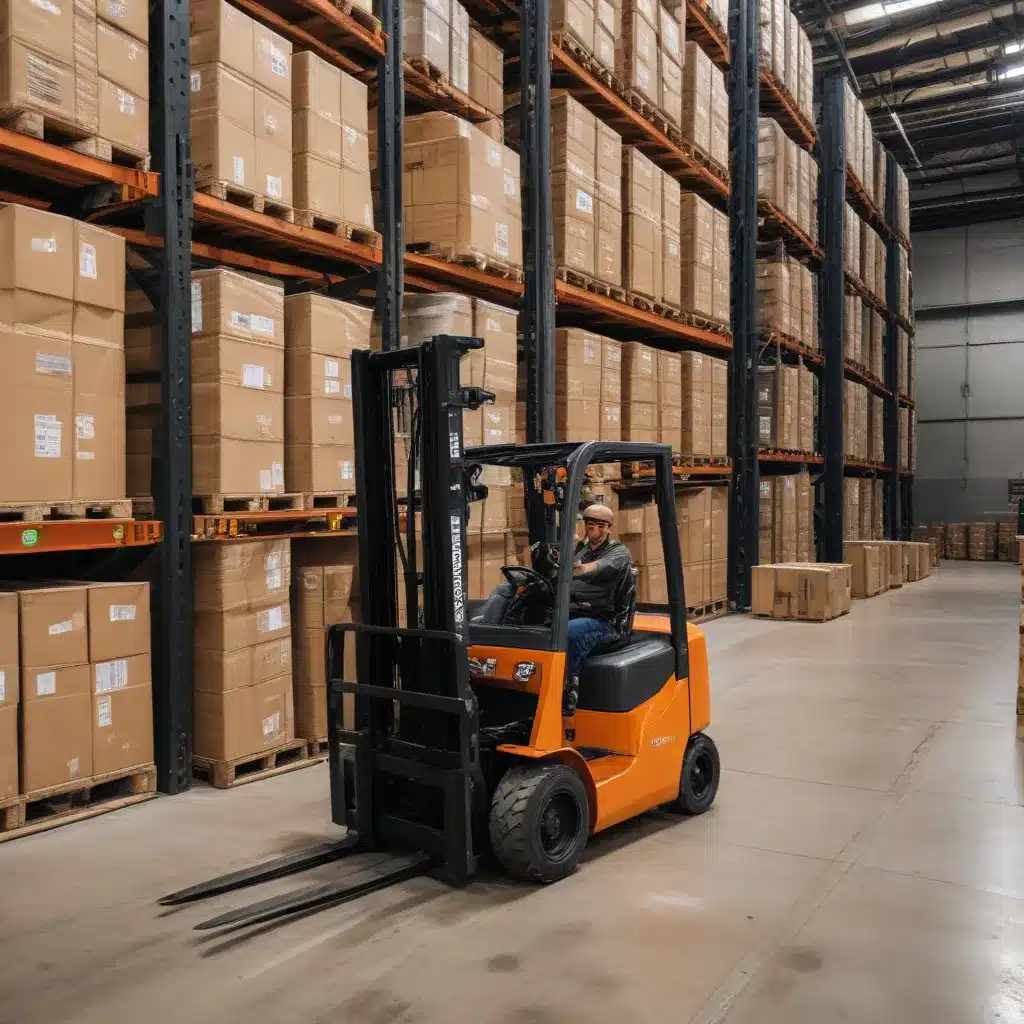
The Evolving Landscape of Forklift Fleet Management
Forklift fleet management has undergone a remarkable transformation in recent years, driven by advancements in technology and changing industry demands. As businesses across sectors strive to optimize their warehouse operations and supply chain efficiency, the strategic management of forklift fleets has become a crucial component of operational excellence.
Today, forward-thinking companies are leveraging data-driven insights to streamline their forklift fleet management, unlocking a world of benefits that go beyond just cost savings. By embracing the latest trends and adopting innovative solutions, organizations can enhance productivity, improve safety, and stay ahead of the competition.
Automation and Robotics: The Future of Forklift Operations
One of the most significant developments in forklift fleet management is the integration of automation and robotics. Autonomous forklifts, equipped with advanced sensors, cameras, and AI algorithms, can now navigate warehouses and perform tasks without manual intervention. These self-driving forklifts offer enhanced efficiency and accuracy, optimizing routes, minimizing idle time, and reducing the risk of accidents.
Autonomous forklifts can work around the clock, significantly increasing productivity and throughput. This automation not only eliminates the need for human operators but also enables seamless coordination between forklifts and other material handling equipment, optimizing the overall workflow within the warehouse ecosystem.
Harnessing the Power of Telematics and IoT
Another transformative trend in forklift fleet management is the integration of telematics and Internet of Things (IoT) technologies. By leveraging sensors, data trackers, and cloud-based platforms, businesses can collect valuable real-time data on forklift performance, maintenance needs, and operator behavior.
This data-driven approach enables proactive maintenance, reducing unplanned downtime and extending the lifespan of forklifts. Furthermore, the connectivity provided by IoT integration allows forklifts to communicate with other devices within the warehouse, promoting seamless coordination and improved efficiency.
Predictive Analytics: Anticipating and Addressing Maintenance Needs
Predictive analytics is revolutionizing forklift fleet management by enabling proactive decision-making. By analyzing historical data and patterns, predictive analytics algorithms can forecast future events and trends, helping fleet managers anticipate maintenance needs, identify potential issues, and optimize resource allocation.
This shift from a reactive to a proactive maintenance approach can significantly reduce downtime, improve forklift reliability, and minimize repair costs. Moreover, predictive analytics can also help optimize fleet utilization, ensuring that each forklift is deployed where it is needed the most based on demand patterns and usage data.
Cloud-Based Fleet Management: Centralized Visibility and Integration
The rise of cloud-based fleet management software has transformed the way businesses manage their forklift fleets. These centralized platforms offer real-time visibility, data analytics, and remote monitoring capabilities, allowing fleet managers to access critical information anytime, anywhere.
Cloud-based solutions often integrate with other systems, such as enterprise resource planning (ERP) and warehouse management systems (WMS), enabling seamless data flow and process automation. By adopting these scalable platforms, companies can streamline their operations, reduce paperwork, and improve overall efficiency, while future-proofing their forklift fleet management strategies.
Sustainable Solutions: The Shift Towards Eco-Friendly Forklifts
As sustainability becomes a key focus for businesses worldwide, the demand for eco-friendly forklifts is on the rise. Electric forklifts powered by clean energy sources are gaining prominence as an environmentally friendly alternative to traditional diesel-powered models. These electric forklifts offer several advantages, including lower emissions, reduced noise levels, and lower operating costs, making them well-suited for indoor operations.
With advancements in battery technology, electric forklifts now offer extended runtimes and quick charging capabilities. Additionally, companies are exploring alternative fuel options, such as hydrogen fuel cells, to power their forklift fleets, providing longer runtimes and faster refueling times compared to traditional batteries.
Unlocking the Potential of Data-Driven Insights
By embracing the trends and technologies driving the future of forklift fleet management, businesses can unlock a wealth of data-driven insights that transform their operations. From optimizing fleet utilization and enhancing maintenance strategies to improving safety and sustainability, data-driven decision-making empowers organizations to:
-
Enhance Productivity: Leverage real-time data and predictive analytics to identify and address bottlenecks, optimize workflow, and ensure that each forklift is utilized to its full potential.
-
Reduce Costs: Proactively manage maintenance schedules, minimize downtime, and make informed decisions about fleet composition and replacement strategies, leading to significant cost savings.
-
Improve Safety: Monitor operator behavior, enforce safety protocols, and implement preventive measures to create a safer working environment for employees.
-
Promote Sustainability: Transition to eco-friendly forklift models, optimize energy consumption, and track environmental impact to align with corporate sustainability goals.
-
Drive Continuous Improvement: Continuously analyze performance data, benchmark against industry standards, and implement strategic adjustments to enhance overall fleet management.
As the forklift fleet management landscape continues to evolve, embracing data-driven insights and innovative solutions will be the key to unlocking operational excellence and maintaining a competitive edge. By partnering with industry experts like Forklift Reviews, businesses can navigate this transformative landscape and leverage the latest advancements to streamline their forklift fleet management strategies.
Conclusion
The future of forklift fleet management is undoubtedly exciting, with endless possibilities for innovation and improvement. By leveraging the power of automation, telematics, predictive analytics, and cloud-based software, companies can optimize their forklift fleet operations, enhance efficiency, reduce costs, and better serve their customers.
As a seasoned industry expert, I encourage businesses to embrace the trends and technologies shaping the forklift fleet management landscape. By doing so, you can unlock a wealth of data-driven insights, drive continuous improvement, and position your organization for long-term success in the ever-evolving world of warehouse and logistics operations.

